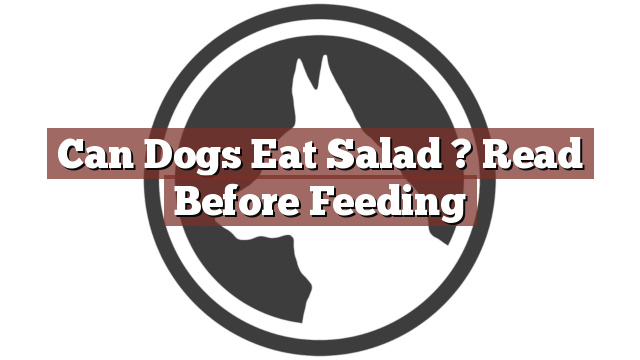Understanding Your Dog’s Dietary Needs
As a responsible dog owner, it is crucial to understand your furry friend’s dietary needs. While dogs are often portrayed as voracious eaters, it is essential to remember that their nutritional requirements differ from ours. A well-balanced diet is crucial for their overall health and well-being. While some human foods can be shared with dogs in moderation, it is always important to exercise caution and research before introducing new foods into their diet.
Can Dogs Eat Salad? Read Before Feeding
Can dogs eat salad? This question might cross your mind as you prepare a fresh and healthy salad for yourself. While vegetables are generally good for humans, it is important to note that not all vegetables are safe for dogs. When it comes to salad, the answer is yes, but with some important considerations and precautions.
Pros and Cons of Feeding Salad to Dogs
Pros:
Feeding salad to your dog can have some potential benefits. Salad greens such as lettuce, spinach, and kale are low in calories and can provide dogs with additional fiber, vitamins, and minerals. These nutrients can contribute to their overall health and support their immune system. Additionally, the crunchy texture of some salad greens can help promote good dental health by reducing tartar buildup.
Cons:
However, there are also some cons to consider before feeding salad to your furry companion. Some vegetables, such as onions and garlic, commonly found in salads, can be toxic to dogs. These ingredients can cause damage to their red blood cells and lead to a condition called anemia. Additionally, certain dressings or toppings, such as those containing grapes, raisins, or nuts, can be harmful or even fatal to dogs. It is crucial to be mindful of these potential hazards and always opt for plain, unseasoned salad greens when sharing with your pet.
Conclusion: Considerations for Feeding Salad to Your Dog
In conclusion, while dogs can eat salad, it is important to exercise caution and make informed choices. Before sharing any salad with your furry friend, ensure that the ingredients are safe for them and avoid any potential toxins or harmful toppings. Always consult with your veterinarian if you have any doubts or concerns about introducing new foods into your dog’s diet. Remember, a well-balanced commercial dog food is designed to meet their specific nutritional needs, and any additions to their diet should be done in moderation and with the guidance of a professional.
Keywords: can a dog eat salad, can my dog eat salad, feeding salad to dogs, dogs and salad.
Thank you for taking the time to read through our exploration of [page_title]. As every dog lover knows, our furry friends have unique dietary needs and responses, often varying from one canine to another. This is why it's paramount to approach any changes in their diet with caution and knowledge.
Before introducing any new treats or making alterations to your dog's diet based on our insights, it's crucial to consult with a veterinarian about [page_title]. Their expertise ensures that the choices you make are well-suited to your particular pet's health and well-being.
Even seemingly harmless foods can sometimes lead to allergic reactions or digestive issues, which is why monitoring your dog after introducing any new food item is essential.
The content provided here on [page_title] is crafted with care, thorough research, and a genuine love for dogs. Nevertheless, it serves as a general guideline and should not be considered a substitute for professional veterinary advice.
Always prioritize the expert insights of your veterinarian, and remember that the health and happiness of your furry companion come first.
May your journey with your pet continue to be filled with joy, love, and safe culinary adventures. Happy reading, and even happier snacking for your canine friend!

